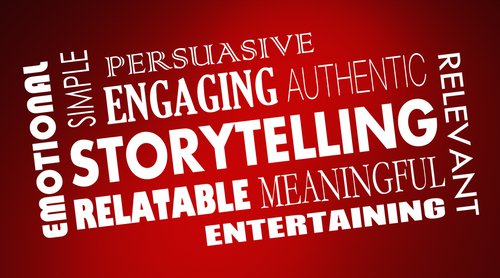
Crafting a Bigger Story: The Imperative of Strategic brand Storytelling
Because TV spots and other forms of traditional advertising are no longer the primary medium to reach consumers, marketers are being challenged to craft a bigger story. In the past, a commercial could easily provide a 20 to 45-second narrative. Today, you need to showcase a cohesive brand personality across multiple forms of social media, in ads, and on your website.
Here are five imperatives from our experienced brand consultants that stress why brands looking for growth need to cultivate a strategic storytelling technique.
1) Storytelling Gives Your Brand a Voice
With the amount of noise in today’s crowded digital world, brands need to stand out and differentiate more than ever if they want to be noticed. Competition for attention on social media and in search rankings is more intense than it has ever been, and it’s not going to get any easier. However, a coherent brand voice and storytelling can help brands break through and reach their audience.
A brand voice is about consistency with the voice you are creating and positioning yourself as an easily recognized and authoritative source for your area of expertise. Together, these elements create the ultimate representation of your brand.
2) A Clearly Communicated Brand Story is the Pillar of a Robust Marketing Strategy
Stories create a blueprint for organizing marketing content that would otherwise feel disparate and random. When a brand’s marketing strategy is built around a story, every piece of content produced should have a purpose and value proposition that feeds and supports the business’ overarching vision. Furthermore, a brand story helps convey a business’s purpose to the marketplace—although having purpose and values as a business does sell, they need to be communicated with a story that captures people’s attention.
3) Storytelling Enables Sharing Consistent Messaging Across Channels
Although every brand has a story to tell, many businesses fail to communicate that story consistently, captivatingly, and effectively through marketing communication. Marketers often have elaborate ideas and visions for what their brand should represent, but when it comes to communicating that story via online channels, the content is confusing, ambiguous, and inconsistent.
Consumers regularly switch between different channels before making a purchase, so if you deliver a consistent marketing message via every channel and every platform, buyers will remember you. They'll likely remember your brand values and your message. So, say it the same way everywhere you say it.
4) Stories Inspire Emotional Connections and Create Brand Loyalty
When your brand tells a consistent, compelling story, you have the chance to build brand loyalty. Stories not only engage us emotionally but also help build trust and even inspire action; they are one of the most powerful tools that brands have to persuade.
Stories help you transform boring data points about your organization (which most people typically forget) into a narrative that resonates on a meaningful, human level. Driving your brand to an emotional place makes it easier for employees to align their values with your organization, and your customers more clearly see their world with you in it.
Your stakeholders will develop an affinity for your brand and begin to associate with the products or services you provide. This connection becomes even stronger when people love your brand not only for what you say and do but also for what their connection to you says about them.
5) Your Story Sets You Apart and Positions Your Brand in Consumers’ Minds
According to Philip Kotler (known as the “Father of Modern Marketing”), brand positioning is “the act of designing the company’s offering and image to occupy a distinctive place in the mind of the target market.” In other words, marketers need to differentiate their brand from competitors so that customers can instantly recognize it. The goal of brand positioning is not only to make your audience understand how your brand is different from the competition but also to make them perceive it in a specific way. The art of storytelling can categorically help you achieve that objective.
If you properly design the narrative, plot, and characters of a brand story around your audience’s needs and desires, it will trigger an emotional response and make them want to engage with your products and services.
In Conclusion
Your brand story goes beyond describing what your company does to sell its brand. Storytelling is a powerful tool for businesses and a skill that every business building a compelling and lasting brand should master. Well-crafted stories don’t only engage first-time visitors but can also make them fall in love with your brand and become loyal and long-term customers.
So, how can you stand out? By harnessing the power of storytelling to create a strong, consistent, and compelling brand narrative that resonates with your audience and sets you apart in the marketplace.
Ready to elevate your brand with strategic storytelling? Reach out today to discover how our expertise can help your brand stand out, connect, and grow. Let's craft your story together!
Recent Posts
Posts by Topics
- Brand Strategy (57)
- Brand Strategy Consulting (28)
- Brand Differentiation (27)
- Customer Experience (24)
- Brand Positioning (22)
- Marketing Strategy (9)
- Brand Extension Strategy (8)
- Customer Behavior (8)
- Brand Architecture Strategy (7)
- Brand Extension (7)
- Brand Growth (7)
- Brand Portfolio & Architecture (7)
- Brand Purpose (7)
- Brand Value Proposition (7)
- Brand Engagement (6)
- Brand Portfolio Strategy (6)
- Brand Storytelling (6)
- Rebranding Strategy (6)
- Brand Awareness (5)
- Brand Image (5)
- Branding (5)
- Rebranding (5)
- Technology (5)
- B2B Brand Strategy (4)
- Brand Experience (4)
- Value Proposition (4)
- Brand Extendibility (3)
- Brand Metrics (3)
- Brand Repositioning (3)
- Corporate Branding (3)
- Differentiation Strategy (3)
- Measurement & Metrics (3)
- Brand Engagement Strategy (2)
- Brand Portfolio (2)
- Brand Promise (2)
- Brand Voice (2)
- Digital Marketing (2)
- Digital and Brand Experience (2)
- Employee Brand Engagement (2)
- Brand Architecture (1)
- Brand Development (1)
- Brand Equity (1)
- Brand Identity (1)
- Brand Measurement (1)
- Brand Name (1)
- Brand Strategy Consultants (1)
- Brand Strategy Firms (1)
- Digital Strategy (1)
- Internal Branding (1)
- Messaging (1)


